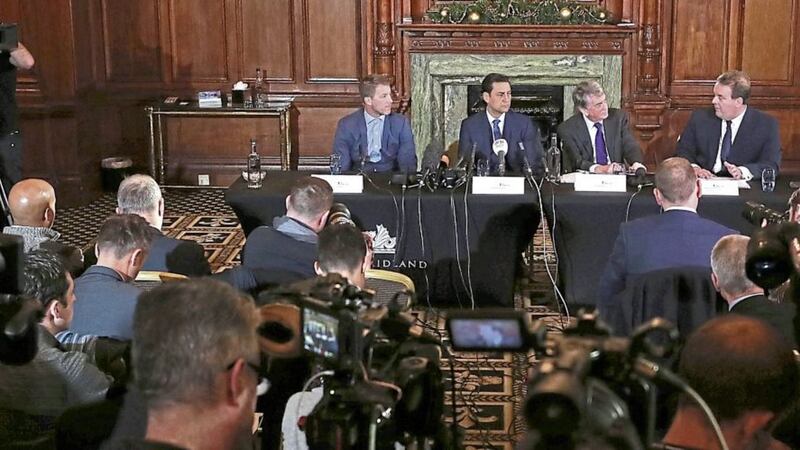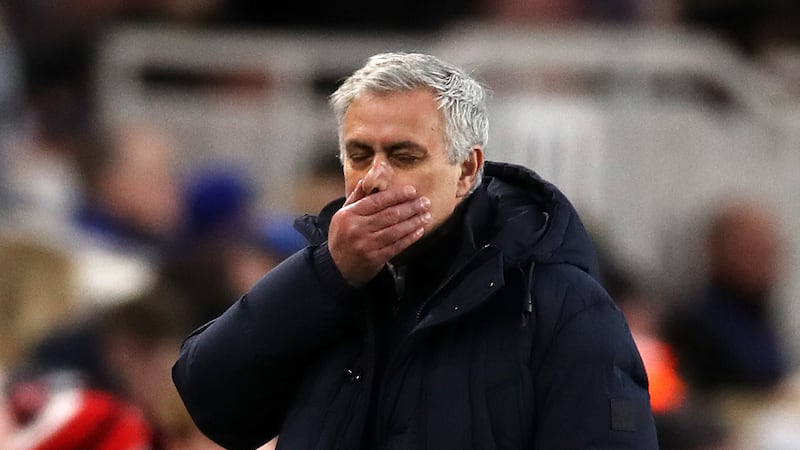SOMETIMES, a situation can be simultaneously unsurprising and completely shocking.
That’s the case with the emergence of the sexual abuse scandal in professional soccer in Britain and now Northern Ireland. The scale of the abuse of young boys is only beginning to be uncovered but already the stories of what went on are appalling.
Child abuse has been detailed in other sports, including swimming, gymnastics, boxing, so no one should be surprised that the world’s most popular sport has this problem, nor that it has been covered up, hushed up for so long.
Paedophiles exploit fear, enforce silence by making their victims feel ashamed, feel as if they are somehow to blame for the crimes being committed against them.
In relation to soccer scouts and coaches, they have been able to make their victims believe that they will miss out on the chance of sporting stardom or even just a career playing the sport they love if they speak out about what is being done to them.
The abusers are people of influence and standing within the game, evil enough to call their accusers liars if any are brave enough to tell others about what they’re suffering.
The result is that victims speak in whispers - whispers which many of us have heard over the years. Unfortunately, paedophiles were almost indulged by society for decades, with an attitude that they were mostly harmless, if a little odd.
As if all they were doing was some ‘touching up’, not understanding the emotional and psychological damage that even abuse at the lower end of the scale could do to the victims.
There’d be tittered asides about the coach with ‘a fondness for little boys’. Even teenage boys would comment on the half-heard rumours, joking to each other that ‘He likes you’, or laughing ‘Watch out for him’. Those who were able to laugh, that is.
Looking back, perhaps those who didn’t giggle, who stayed silent, were victims themselves. Clearly such child abuse is no laughing matter.
People need to understand that often what occurred was the rape of children. That’s the stark, disgusting truth of it. Vulnerable, weaker children being raped and abused by nasty perverts.
The damage done to them is such that anyone who manages to speak out, either at the time or in later life, should be hailed for their courage.
Not criticised, as that odious oaf Eric Bristow did, the former darts champion wondering why victims didn’t simply go and beat up their attackers when the boys grew up. Simply getting on with their lives is an achievement for some victims, never mind confronting those who traumatised them.
The most high profile case in soccer before now was that of Celtic Boys Club, whose founder and manager Jim Torbett abused future Scotland international Alan Brazil among others.
It wasn’t until the mid-90s that Torbett was tried and convicted for his crimes. Sadly, many people used that case to score petty sectarian points rather than wondering if other perverts at other clubs were also using their positions of influence to abuse young boys.
Hopefully, the fact that Celtic’s great rivals Rangers apparently did the right thing and sacked a youth coach in the 1980s following an allegation of inappropriate behaviour towards a teenage player will be used as an example of how to act correctly rather than as a stick with which to beat the Bhoys again.
Gordon Neely was a youth coach at Ibrox in the 1980s when police were contacted over the claims made by the player, and the club said he was “dismissed immediately”.
More important is the fact the police were told of the allegations. Too often, that was not the case. Almost as bad as the actual abuse were the cover-ups carried out to protect reputations of clubs - which in turn allowed abusers to carry on.
Chelsea have apologised for asking former player Gary Johnson to sign a non-disclosure agreement in return for a £50,000 payment because he had been sexually abused by the club’s former chief scout Eddie Heath between 1978 and 1981.
Incredibly, that ‘hush money’ was paid LAST YEAR.
Before Johnson went public in a newspaper interview, Football Association chairman Greg Clarke had, quite rightly, said he found the idea of confidentiality clauses in child abuse cases as “morally repugnant”, while his chief executive Martin Glenn said “hushing up” was a breach of FA rules.
The FA, and its counterpart associations around the world, need to make clear to clubs that any more cover-ups will not be tolerated and will be punished severely.
Lawyer Edward Smethurst, speaking at the launch of the Offside Trust – an independent body set up by victims of abuse at football clubs to “fight for justice” and provide support – confirmed that former players have told him other clubs asked for confidentiality clauses in compensation packages for sexual abuse by coaches within their youth systems.
Smethurst also stated: “There are absolutely people, involved in the game today, who victims have spoken to me about. I can’t comment until further investigation, but they certainly need further investigation.”
People used to think young boys were damaged by having their dreams of becoming a professional footballer dashed at an early age if they were let go by clubs.
Unfortunately, far, far worse has been going on for decades. The challenge for soccer now is two-fold: to help the victims in whatever ways possible; to seek out any current abusers; and to ensure that the likelihood of future abuse is reduced if not eradicated completely.
Now is the time for openness, not secrecy. No one should laugh off or instantly dismiss whispers, although obviously allegations must be substantiated.
Other sports should also note that there is no room for complacency, even though child protection guidelines have done much to reduce the risks in recent years.
Child abuse is society’s problem and sexual predators will use whatever opportunities they can to get access to children. At least now it’s the paedophiles who should be running scared.








